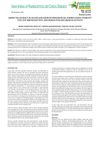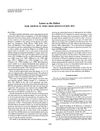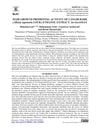January 2020 in “Indian Journal of Pharmaceutical Sciences” Natural products show promise for new hair loss treatments.
 4 citations,
August 2022 in “The Scientific World Journal”
4 citations,
August 2022 in “The Scientific World Journal” Merremia peltata leaf extract, particularly the bufotalinin compound, shows potential for treating hair loss.
[object Object]  June 2017 in “Asian journal of pharmaceutical and clinical research”
June 2017 in “Asian journal of pharmaceutical and clinical research” Green tea extract gel safely increases eyelash length.
 3 citations,
January 2021 in “Applied sciences”
3 citations,
January 2021 in “Applied sciences” Fermented red ginseng and a traditional herb mix improved hair growth in mice.
 76 citations,
August 2018 in “International Journal of Cosmetic Science”
76 citations,
August 2018 in “International Journal of Cosmetic Science” Dermal Papilla cells are a promising tool for evaluating hair growth treatments.
 11 citations,
January 2018 in “RSC Advances”
11 citations,
January 2018 in “RSC Advances” Cedrol cream is more effective and safe for promoting hair growth than traditional treatments.
 7 citations,
November 2022 in “Communications biology”
7 citations,
November 2022 in “Communications biology” Keratin injections can promote hair growth by affecting hair-forming cells and tissue development.
 41 citations,
July 2015 in “Current Drug Discovery Technologies”
41 citations,
July 2015 in “Current Drug Discovery Technologies” Some plants may help with hair growth and have fewer side effects than synthetic drugs, but more research is needed to confirm their effectiveness.
 1 citations,
December 2016 in “Trichology and cosmetology:”
1 citations,
December 2016 in “Trichology and cosmetology:” Panax ginseng might help with hair growth and has fewer side effects than synthetic treatments.
 3 citations,
January 2016 in “Annals of Dermatology”
3 citations,
January 2016 in “Annals of Dermatology” Minoxidil was the most effective treatment for hair regrowth in rats compared to Aminexil or Kerium.
 11 citations,
December 2011 in “Revista Brasileira de Farmacognosia”
11 citations,
December 2011 in “Revista Brasileira de Farmacognosia” The seeds of Abrus precatorius, when processed, can prevent hair loss more effectively than common treatments.
[object Object]  1 citations,
January 2022 in “Stem cell biology and regenerative medicine”
1 citations,
January 2022 in “Stem cell biology and regenerative medicine” New methods to test hair growth treatments have been developed.
 25 citations,
August 1992 in “In vitro cellular & developmental biology”
25 citations,
August 1992 in “In vitro cellular & developmental biology” The new system can grow hair in the lab and test hair growth treatments.
 44 citations,
January 2007 in “Biological & pharmaceutical bulletin”
44 citations,
January 2007 in “Biological & pharmaceutical bulletin” Black pepper leaf extract contains compounds that can block testosterone effects and promote hair growth.
 5 citations,
February 2011 in “Expert Opinion on Drug Discovery”
5 citations,
February 2011 in “Expert Opinion on Drug Discovery” We need better treatments for hair loss, and while test-tube methods are helpful, they can't fully replace animal tests for evaluating new hair growth treatments.
December 2024 in “International Journal of Scientific Reports” The plant-based hair serum is a promising and safe alternative to minoxidil for hair regrowth.
 3 citations,
March 2023 in “Scientific Reports”
3 citations,
March 2023 in “Scientific Reports” Researchers developed a new method to test hair growth drugs and found that adult cells are best for hair growth, but the method needs improvement as it didn't create mature hair follicles.
 1 citations,
January 2022 in “Rasayan journal of Chemistry”
1 citations,
January 2022 in “Rasayan journal of Chemistry” Albizia saponaria bark ethanol extract, particularly at 15%, promotes hair growth in rabbits.
 3 citations,
November 2019 in “DOAJ (DOAJ: Directory of Open Access Journals)”
3 citations,
November 2019 in “DOAJ (DOAJ: Directory of Open Access Journals)” Pumpkin seed oil may help hair grow and could be an alternative treatment for male hair loss.
 November 2022 in “Bioengineering”
November 2022 in “Bioengineering” The method can test hair growth products using a lab-made hair-like structure that responds to known treatments.
 October 2023 in “Scientific Reports”
October 2023 in “Scientific Reports” Oxytocin may help hair grow by increasing hair growth-related genes and factors.
 1 citations,
September 2022 in “Evidence-based Complementary and Alternative Medicine”
1 citations,
September 2022 in “Evidence-based Complementary and Alternative Medicine” Gardenia florida fruit extract may help hair grow and needs more research to understand how.
 9 citations,
June 2021 in “Nutrients”
9 citations,
June 2021 in “Nutrients” Fisetin in fruits and vegetables helps hair growth in mice.
 10 citations,
December 2019 in “International journal of medicinal chemistry”
10 citations,
December 2019 in “International journal of medicinal chemistry” Chemicals from the plant Dicerocaryum senecioides were found to safely speed up and increase hair growth in mice.
 July 2021 in “IntechOpen eBooks”
July 2021 in “IntechOpen eBooks” Ginseng, especially its component ginsenosides, can promote hair growth, reduce hair loss, and potentially treat conditions like alopecia by affecting cell pathways and cytokines.
73 citations,
November 2000 in “Proceedings of the National Academy of Sciences of the United States of America” There are two ways to start hair growth: one needs Stat3 and the other does not, but both need PI3K activation.
 109 citations,
October 2007 in “Journal of pineal research”
109 citations,
October 2007 in “Journal of pineal research” Melatonin helps regulate hair growth and protects the hair follicle from stress.
 3 citations,
May 2018 in “InTech eBooks”
3 citations,
May 2018 in “InTech eBooks” Animal models, especially mice, are essential for advancing hair loss research and treatment.
 August 2024 in “Frontiers in Pharmacology”
August 2024 in “Frontiers in Pharmacology” Antibody treatments show promise for hair loss but need more research.
2 citations,
January 2009 A natural extract-based hair growth product was developed and showed promise in preliminary tests.

























